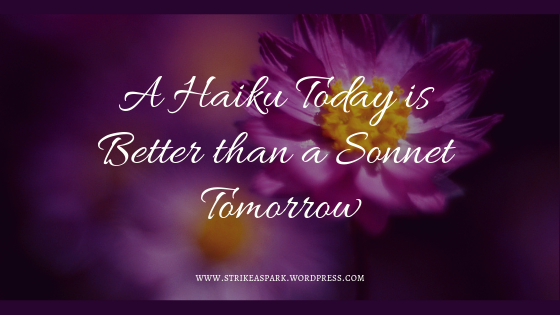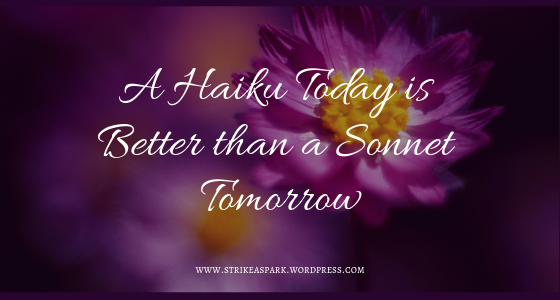
five seven and five
choose words by syllable count
and a haiku is born
~ ~ ~
Sometimes I want to write but – horror of horrors – I don’t know what. And sometimes, you want to start a new project and finish it quickly. Especially when I’m working on longer-term projects (too many to count at this point), there’s an urge to just get something done, already! Do you know that feeling?
So I’ve been writing a lot of haiku. I like them because they invite a touch of contemplation in my busy days, and also because they are quick to write compared to longer poetry forms or novels. That quick hit of gratification (write, publish, done!) is addicting.
Like the good game of Pac-man, haiku are easy to learn and difficult to master. The rules themselves are simple and are based on the syllable count of each line: The first line has five syllables, the second line has seven syllables, the third line has five syllables. There are only three lines, making it a constrained writing space that requires some creativity to convey meaning. Rearranging words and looking up synonyms that fit the syllable count is part of the challenge, and a great deal of the fun.
That’s the simplified version anyhow, the “rules” I learned as a child. Traditionally, haiku have a seasonal theme and juxtaposes two ideas with a “cutting word,” a word which connects the two ideas or ends the poem satisfactorily. Or so I understand. As a haiku hobbyist, I must admit that my understanding is limited, even after reading the Wikipedia entry. It’s a start, though, with plenty of room to grow.
Sonnets, on the other hand, are tricky. There is nothing wrong with sonnets, of course. I like reading sonnets – better yet to hear them acted aloud – and they give off an air of elegance, somehow. But I don’t write sonnets. Sonnets are difficult simply because I never learned them. That’s all, and yet it’s enough of a barrier.
I would like to learn to write sonnets. Someday. But at the moment it feels like a long journey to sonnet mastery, and I’m on enough long journeys at the moment. I know they say to start the journey you want to take now – a single step and all that – yet I believe it is also important to choose which journeys you want to take, and when to take them. And sometimes you need a little break, and that’s okay too.
For me, a haiku today is my break. A haiku today is my chance to contemplate life in this moment while also feeling productive. A haiku today is better than a sonnet tomorrow because I can write it now, with confidence, and enjoy it too.
We’ll leave the sonnets for tomorrow.

Yes, writing a haiku is definitely appealing to many with its simplicity and yet complex creativity in hitting the correct rhyme scheme. 🙂 However, I tend to be more of a free-verse gal …as I like to see what direction the wind will blow me. 😉
LikeLike